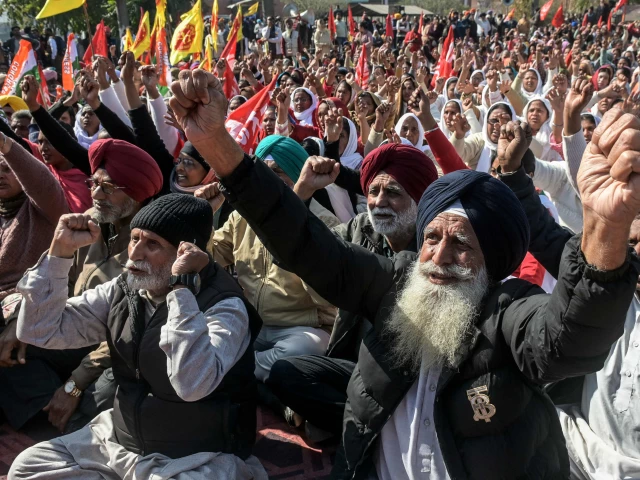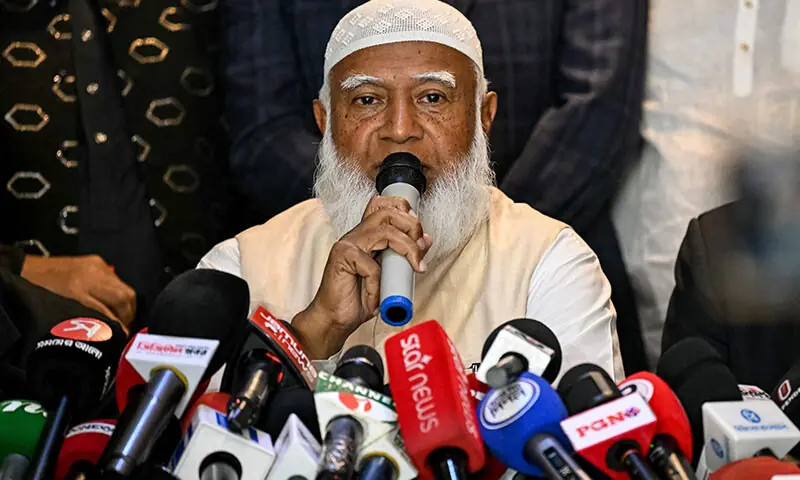“We are not demanding a new state or freedom… we just want our livelihoods back,” says ‘Chaman Parlat’ organiser.
Imagine being under the sun for hours on end, staring at nothing but barren land. Now imagine being just a few kilometres from your family, but not being able to meet them. Imagine using makeshift kitchens and bathrooms because there is no other option. Only 12 hours away from Karachi, people don’t have to imagine any of it; this is their reality.
This is the Chaman border, situated in the far north of Balochistan and one of Pakistan’s most tense international crossings, shared with Afghanistan.
Seated outside a tent, Abdul Manan Akhwond stares at the land stretching for hundreds of miles, transcending colonial boundaries chalked hundreds of years ago. Green and white flags dominate both sides of the horizon, flying almost in unison but never in consensus.
Nearby, caravans of burka-clad women, children and men cross over to the other side. But for the past six months, Akhwond and others like him have not been able to do so.
Why? Because of a decision that permanently changed the lives of the 1.2 million people of Chaman without offering any solutions.
The national apex committee — comprising civil and military officials — decided last year that only those with valid passports and visas would be allowed to cross the Chaman border crossing. Before, Pakistanis and Afghans would cross the border upon showing their respective identity cards. However, the transition from a relatively open to a regulated crossing with stringent document requirements has inadvertently affected the lives of the locals.
So today, hundreds of Pakhtuns remain encamped outside the Friendship Gate — the authorised border crossing between Chaman and the Afghan district Spin-Boldak — against the one-document regime for nearly 180 days.
The demonstrators have witnessed changing seasons, braved tear gas and suffered bullet wounds. They are adamant not to leave their spots until their voices are heard.
“We are not demanding a new state or freedom … we just want our livelihoods back,” said Akhwond, a resident and organiser of the ‘Chaman Parlat’.
Leading the protests from his campsite, a five-minute walk from the border, he has seen three seasons pass by in the last six months, but that is all that changes. “We are Pakistanis, we are the residents of this country, why this injustice then? Our only fault is that we belong to this region,” he rues.
Cutting through the heart
The region Akhwond refers to comprises Chaman from this side of the border and Wesh in Afghanistan. But long before the perpetually guarded check posts propped up and wired fences were erected, this area — in its entirety — was merely a home to the Pakhtuns.
They lived together like a family, connected not just by ethnicity, tribe or culture but also by deep emotions.
In 1893, British Foreign Secretary Sir Mortimer Durand outlined the boundary between Afghanistan and colonial India, bisecting the Pakhtun region. The Durand Line, covering a distance of 2,430 kilometres, cuts through the Pakhtun tribal areas and splits the Pakhtuns into two separate countries.
While Pakistan inherited the Durand Line after independence, there has never been a formal agreement or ratification on it. Islamabad has further upheld the norms of international law and believes that under the convention of uti possidetis juris — the principle that newly formed states should retain international borders from before independence — it automatically inherits the border and does not need an agreement with Kabul.
But locals believe otherwise. “For them, this is not just a piece of land … it is their blood and family,” said Kashif Panezai, the vice chairperson of the Human Rights Commission of Pakistan (HRCP).
The Durand Line, he continued, splits numerous villages in half and divides others from their agricultural territories; it cuts tribes and other groups in half.
“Pakhtuns have been traversing on either side of the border for years. The people on our side have half their families living in Spin-Boldak, their sisters have been married on the other side of the border, they have their businesses set up there … they even bury their dead in one graveyard,” Panezai elaborated.
Until October last year, the Pakhtuns were still able to do all this, with the only requirement to cross the border being a CNIC. “Most of them would cross into Wesh in the morning and return by evening with daily wages of around Rs2,000-Rs3,000,” the HRCP vice chair says.
But for over six months now, the Pakhtuns of Chaman have been cut off from friends, families and livelihoods.
‘One tribe from Quetta to Kandahar’
Moladad Sultan has taken two loans since the start of the year. Like many of his neighbours, his ancestral land is split into two on both sides of the border. The 35-year-old previously ran a business, purchasing dry fruits from Afghanistan and selling them locally.
But things have not been working ever since the one-document regime was rolled out. “We are sitting idle in our houses for days, we don’t even have money for food,” Sultan tells Dawn.com.
He is among the hundreds of Chaman residents protesting in front of the Friendship Gate. “From Kandahar to Quetta, all of us Pakhtuns are one tribe.
“We have mosques whose gates are in Pakistan but their minarets are in Afghanistan … should I get a passport to offer Zuhr prayers? Does it even make sense?” asked Sultan. He is not against the new visa and passport policy but feels it is unnecessary, particularly given the nature of the Chaman border.
Nevertheless, Sultan took a chance and visited the local Nadra office in January, only to find it dysfunctional. “There is no system in place, they told me to pay Rs50,000 for an ‘urgent passport’.
“Three months have passed and I have not received my documents, only because I refused to give in,” he lamented.
Meanwhile, Sadiq Achakzai, the spokesperson of Chaman Parlat, says that people living in the 100 square kilometre area spreading from Quetta to Kandahar were interconnected. “Our water, land and livelihoods have remained linked to each other for years.”
Management at the border here, he elaborated, was effective even before Oct 31 with CNICs and Tazkira (Afghan identity card) being checked via biometric verification. “Unfortunately, in the last six months, the reputation of this area was tainted with false accusations of terrorism and a new system was brought in place.
“Passport is not a requirement for locals even on the Mexico border,” he pointed out, adding that Afghanistan was Pakistan’s “best friend” and trade between the two countries could benefit their respective economies.
But the usually hopeful Achakzai has been forced to lower his expectations over the past few months. “Both military and civilian leaders have visited us numerous times during our protests but they all follow the same drill: make promises that are never fulfilled,” he told Dawn.com.
“This is a waiting game that never comes to an end.”
From where Achakzai stands, lorries stationed at the mouth of the Friendship Gate can be seen, waiting in a long queue to cross the border.
At first glance, it looks like any other border crossing. But take a closer look and you would see symmetrical white tents housing desolate faces. Yet, they are also resolute; whether praying or breaking the fast, these men never take a break. Their lives are being lived on the protest site.
Over the past six months, the protesters have held several rounds of negotiations with the government. But none of them emerged successful.
“We held talks with the local administration but they clearly said the matter was not in their hand,” Akhwond says. “We met Maulana Fazlur Rehman, Sarfraz Bugti and Sadiq Sanjrani … they made promises and said our demand was just.
“But the conversations always ended with them saying that the situation was beyond them because the military leadership took the decision [on visa and passport requirements],” he says.
“We are being repeatedly told that the new policy was formed because of security threats, but no one tells us what these threats are. All the people here in Chaman are labourers who cross the border for daily wages.”
Akhwond is even ready to go to Islamabad and talk to the army chief. But despite several attempts, he hasn’t been able to secure a meeting yet. “I’m sure I can convince him if I get a chance,” he asserted.
His voice, however, is laced with urgency. “The law and order situation in Chaman is beyond repair … I have seen people take their lives in the last few months and the crime rate has surged,” he said, warning that the situation could worsen in the upcoming days.
‘Two-way street’
Chaman Deputy Commissioner Captain Raja Athar Abbas, on the other hand, blames the protesters’ “inflexibility” for unsuccessful negotiations.
“If you look at it through the legal lens, the government’s decision is in line with internationally outlined processes. Every state has a right to form its own border rules,” he says. “The problem of Afghan nationals entering Pakistan without authentic documentation is worrisome and needs to be addressed.”
But at the same time, Captain Abbas agrees that the difficulties faced by the residents of Chaman were “genuine”. He said that the state was doing all it could to accommodate the protesters and has been showing leniency on humanitarian matters such as deaths and health issues.
“In our recent meetings with the higher-ups, we also suggested a one-time visa fee waiver to encourage locals,” he told Dawn.com, adding that no decision had however been taken on that so far.
That being said, DC Abbas continued, the state has shown restraint from day one. “No matter what happens, our utmost priority is the safety of the protesters,” he said.
The official’s statement, however, is a little conflicting because Akhwond claims that personnel of the Frontier Corps recently opened fire at the demonstrators. Video footage widely shared on mainstream and social media also showed authorities using tear gas.
“Well, we will have to respond if anyone takes the law in their hands,” the DC said in response to the incident. “It is always a two-way street.”
He further recalled that the government had peacefully dealt with the protesters when they had blocked the border crossing from Nov 21 to Feb 18, which had resulted in a “daily loss of Rs150 million”. While business soon resumed as usual, the protesters remained stationed outside the Friendship Gate.
Islamabad needs to come to Balochistan
HRCP’s Panezai recently led a fact-finding mission to Chaman to ascertain the impact of border control restrictions on locals and examine the ongoing protests. He explained that the roots of the problems faced by Pakhtuns go a long way back.
For years, their main source of livelihood has been dependent on the transportation and sale of items — mostly auto parts and electronics — from one side of the border to the other. But this trade was never documented, hence causing an outflux of money from Pakistan and increasing smuggling.
“The decision on Oct 31 was taken primarily to prevent this outflux,” Panezai elaborated. However, what the rulers forgot was that the Pakhtuns did not have an alternative source of income.
“The economic situation in Chaman today is challenging with high levels of unemployment and poverty,” he highlighted. What’s worse is that it is the daily wagers and the ordinary people who are suffering from the new policy.
“Containers of bigwigs and tycoons are being allowed to cross the border, without any restriction, in exchange for bribes,” said the HRCP vice chair. “Even the locals have been told that they could cross into Afghanistan without any documentation if they paid a certain amount of money.”
But the Pakhtuns have refused to do so. “We are ready to file our taxes, but will not pay bribes to the local administration and FC at checkposts,” Akhwond told Dawn.com.
In its findings from Chaman, the HRCP fact-finding committee had concluded that there was a dire need for dialogue between the government and the protesters. Panezai stresses that Islamabad needs to come to Balochistan and find a solution.
“Inclusive policies can only be formed when the government is aware of the ground realities,” he said, adding that the Centre should prioritise the wellbeing of families, particularly with cross-borer ties, to ensure that their basic needs and rights were upheld.
Further, the HRCP highlights that efforts should be made to enhance economic opportunities in Chaman through investment in local industries, job creation, and support for small traders.
The commission also recommended that balancing national security interests with the legitimate needs of the local population was essential and steps should be taken to address concerns related to smuggling and security while minimising adverse effects on the daily lives of residents.
“If Pakistan does not tackle this issue now, it will create a huge problem in the near future,” Panezai warned.
Special thanks to Dawn’s Balochistan correspondent Abdullah Zehri






